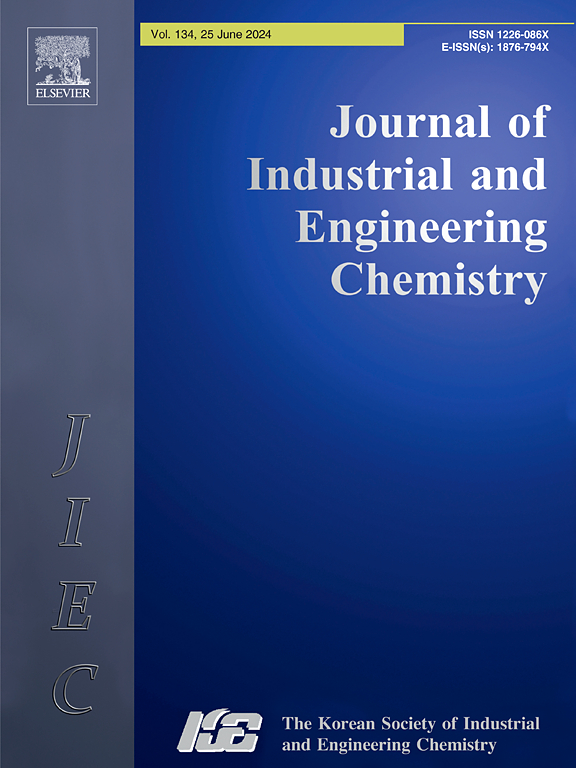In-situ preparation of ionic liquid lubricating additives for enhanced lubrication performance in titanium alloys: Experimental and molecular dynamics simulations
IF 5.9
3区 工程技术
Q1 CHEMISTRY, MULTIDISCIPLINARY
Journal of Industrial and Engineering Chemistry
Pub Date : 2025-03-25
DOI:10.1016/j.jiec.2025.03.037
引用次数: 0
Abstract
This work explores the lubrication properties of aqueous solutions containing ionic liquids in contact with cemented carbide and titanium alloy, focusing on the influence of alkyl chain structure. Surface morphology and chemical elements of the worn surface were analyzed using SEM and XPS, and the corrosion resistance was tested. The findings indicate that lubricants containing ionic liquids with unsaturated long alkyl chains can achieve a 70% reduction in friction coefficient and a 91% decrease in wear volume. Ionic liquids in aqueous solutions can effectively prevent the corrosion of gray cast iron by water molecules. Also, quantum chemical calculations and molecular dynamics simulations suggest that anions with unsaturated long alkyl chains exhibit a low energy gap and strong adsorption to the titanium alloy substrate. This implies that to react thermochemically with the metal substrate when it is heated by friction, creating a protective tribofilm. In the torque tests, lubricants containing ionic liquids with unsaturated long alkyl chains penetrate the gaps between the tap and titanium alloy more easily, adsorb onto the contact interface, and form a protective film, resulting in lower torque values. This suggests that the lubricant can serve as a high-performance potential additive in metalworking fluids.

原位制备增强钛合金润滑性能的离子液体润滑添加剂:实验和分子动力学模拟
本文研究了含离子液体水溶液与硬质合金和钛合金接触时的润滑性能,重点研究了烷基链结构的影响。利用SEM和XPS分析了磨损表面的形貌和化学元素,并进行了耐蚀性测试。结果表明,含不饱和长烷基链离子液体的润滑油,摩擦系数降低70%,磨损体积降低91%。水溶液中的离子液体能有效地防止灰口铸铁受水分子的腐蚀。量子化学计算和分子动力学模拟表明,具有不饱和长烷基链的阴离子具有较低的能隙和对钛合金基体的强吸附。这意味着当金属衬底被摩擦加热时,与它发生热化学反应,形成一层保护性的摩擦膜。在扭矩测试中,含有不饱和长烷基链离子液体的润滑剂更容易穿透丝锥与钛合金之间的间隙,吸附在接触界面上,形成保护膜,导致扭矩值较低。这表明该润滑剂可以作为一种高性能的金属加工液添加剂。
本文章由计算机程序翻译,如有差异,请以英文原文为准。
求助全文
约1分钟内获得全文
求助全文
来源期刊
CiteScore
10.40
自引率
6.60%
发文量
639
审稿时长
29 days
期刊介绍:
Journal of Industrial and Engineering Chemistry is published monthly in English by the Korean Society of Industrial and Engineering Chemistry. JIEC brings together multidisciplinary interests in one journal and is to disseminate information on all aspects of research and development in industrial and engineering chemistry. Contributions in the form of research articles, short communications, notes and reviews are considered for publication. The editors welcome original contributions that have not been and are not to be published elsewhere. Instruction to authors and a manuscript submissions form are printed at the end of each issue. Bulk reprints of individual articles can be ordered. This publication is partially supported by Korea Research Foundation and the Korean Federation of Science and Technology Societies.

 求助内容:
求助内容: 应助结果提醒方式:
应助结果提醒方式:


